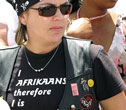ANC revivalism and non-racialism

South Africa’s ruling party, the African National Congress, has announced that it wants to attract more white voters. Tim Murithi says this would require the adoption of a more inclusive ‘nation-building’ and non-racial posture.
Following the recent African National Congress (ANC) National Governing Council (NGC), convened in September in Durban, Secretary-General Gwede Mantashe called for the introduction and implementation of programmes that would increase the party’s ballot share from six to 50 per cent of white voters, in order to fulfill the aspiration ‘of becoming a truly non-racial party’. The reasons for this are manifold, but clearly rooted in the electoral challenges emerging from opposition parties and in the formation of coalitions to contest against the ANC.
On a basic level, this strategy suggests an evident self-interest in plans for the ‘revival’ of the ANC and expansion of its voter support base. It is important to acknowledge the problematic nature of designating certain groups as ‘black’ and others as ‘white’, and also to recognise that while not all ‘blacks’ support the ANC, neither are all ‘whites’ against it.
However, the wider issue of whether non-racialism can be achieved following the brutalizing strictures of apartheid and the colour-coded nature of human relations in the country, has to also be addressed. This would require advancing racial dialogue and engaging with others that one would not ordinarily engage with. For the ANC, this would require an internal process of change and a final break with its ‘struggle’ rhetoric, towards the adoption of a more inclusive ‘nation-building’ and non-racial posture.
On a basic practical level this could include ensuring that ANC gatherings are broadly inclusive to cadres from different cultural backgrounds. Perhaps song sheets could be distributed to those who are unaware of the lyrics of the multiple ‘struggle’ anthems that are regularly belted out at party conventions. Yet, there is a larger question - and one that echoes Julius Malema’s equality court case earlier this year - of whether or not some of these songs are appropriate in the new South Africa. Is it not time for new songs that embrace the collective and non-racial spirit of the new South Africa, which Mantashe claims the ANC aspires to achieve?
At the level of governance serious efforts have to be undertaken to address persistent perceptions of corruption. While this issue was addressed at the NGC, the success or failure of a new strategy to combat corruption will have to be clearly demonstrated before the ANC can hope to broaden its constituency. The challenge to the party will be to address the needs of its substantial black support base and at the same time respond to some of the white voters it seeks to attract.
On one level, Mantashe’s agenda reflects a noble aspiration, because South Africa still struggles to animate and bring to life the principles that informed the 1955 Freedom Charter and the 1996 constitution. In particular, the Freedom Charter explicitly states that ‘South Africa belongs to all who live in it, black and white, and that no government can justly claim authority unless it is based on the will of the People’. The Constitution of this country also affirms this in its preamble, which proffers that ‘South Africa belongs to all who live in it, united in our diversity’.
The Constitution also stipulates that South Africa is founded on, among others, the values of ‘non-racialism’. The Bill of Rights also states that ‘every citizen is free to make political choices, which includes the right to participate in the activities, or recruit members of, a political party’. Mantashe’s agenda to increase the number of whites in the rank and file of the Party’s cadres, under the wider rubric of ANC revivalism, is therefore in keeping with the aspirations contained in both of these important texts.
However, the Freedom Charter also states that ‘all people shall be entitled to take part in the administration of the country’, but in order to do so at the level of government it is self-evident that all cultural backgrounds need to be represented in present and future ruling political parties.
This is the conundrum that the ANC finds itself. It has naturally gravitated towards responding to the urgent and pressing needs of the majority of the population that was previously disadvantaged and has consequently acquired its current composition. There is nothing untoward with such a development. Political parties have to necessarily cater to a constituency and hope that such a constituency propels them to power. But once in government it also becomes evident that governing has to be for ‘all who live’ in South Africa.
Whether the ANC can undergo the internal transformation required to ultimately appeal to a wider non-racialised constituency will remain a key challenge for the Party. It is a challenge that the ANC leadership seems interested in taking on, but the rhetoric has to give way the reality of genuine inclusivity.
BROUGHT TO YOU BY PAMBAZUKA NEWS
* Dr. Tim Murithi is head of the Transitional Justice in Africa programme at the IJR.
* Please send comments to [email protected] or comment online at Pambazuka News.
